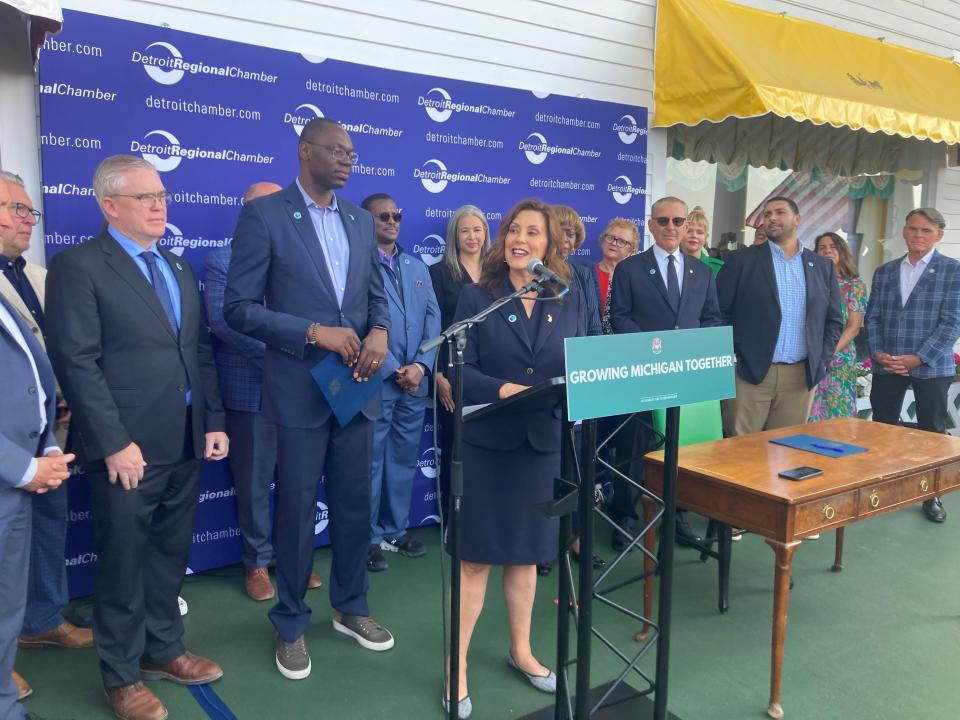From K-12 to K-14? Council hears recommendations to boost Michigan's population
Members of the Growing Michigan Together Council, a board tasked with presenting Gov. Gretchen Whitmer and legislative leaders with policy solutions to boost the state's stagnant population, heard the first recommendations Thursday from a series of work groups designed to sustain population growth in the following decades.
And while some recommendations were short on policy specifics, the work groups' findings appear to be an ambitious shift in the state's current strategies for education, infrastructure and job creation. Among the recommendations: extending the current scope of public education from being K-12 to being K-14, by providing two tuition-free years at a community college or a public university and "fully funding" the state's education system.

In total, the council heard recommendations from work groups in four areas: pre-K-12 education, higher education, jobs, talent and people, and infrastructure and place. For some recommendations, work group leads didn't point to specific policy changes, but rather goals state leaders should strive to meet. Here are some of the recommendations presented to the Growing Michigan Together Council:
Pre-K education
Karen McPhee, who was an education policy adviser to former Gov. Rick Snyder, said families are more likely to come to a state where public schools offer the chance for students to not only achieve academically but access career-based extracurricular activities and well-trained teachers.
"High-performing public schools are the genesis to growing communities,” McPhee said.
McPhee said Michigan's current K-12 education system was designed at a time when a high school education could guarantee a comfortable middle-class lifestyle, referencing factory jobs previously abundant during Michigan's industrial boom.
Among the K-12 work group's recommendations were "fully funding" the state's public schools and creating more opportunities for teachers to attain career training. Additionally, Michigan should provide up to one year of extra education after high school graduation to ensure graduates are prepared to either attend a higher education institution or enter the workforce, said Chandra Madafferi, president of the Michigan Education Association.
Higher education
Bill Pink, president of Ferris State University in Big Rapids, said Michigan should reimagine K-12 education into K-14 education by providing two tuition-free years at either a community college or a public university. Additionally, Pink said the state needs to have safeguards in place to ensure that students who attend community college will have their credits recognized once they transfer to a four-year university.
“It’s painful for students to finish 60-70 credit hours at a community college and get to a university and see only 35 hours transfer," Pink said.
Michigan also needs to do a better job of reversing its "brain drain" — currently, more students who obtain degrees in Michigan are leaving the state, versus those receiving degrees outside of Michigan and entering the state. Pink and Henry Ford College President Russ Kavalhuna said the state needs to incentivize recent graduates to seek employment in Michigan.
Jobs, talent and people
Attracting and retaining talent is central to Michigan's population goals.
Marty Fittante, CEO of northern Michigan economic development organization InvestUP, highlighted areas where Michigan can improve its talent retention and attraction by creating workforce development programs and making community placemaking investments. Additionally, Fittante said Michigan needs to develop a pipeline for international talent, but also create a welcoming environment for that talent so those who migrate to Michigan internationally remain in the state long-term.
Infrastructure and place
"Decades of disinvestment" have left Michigan with crumbling roads and a lack of accessible housing, said former Secretary of State and current Wayne State University Board of Governors member Terri Lynn Land.
Land and Central Michigan University Trustee Regine Beauboeuf highlighted a series of areas for the state to invest in: revitalizing its housing stock, making sure its water infrastructure can handle a changing climate, updating the state's transportation funding model and investing in site-readiness programs to shift the state's economic model "from reactive to proactive."
Population focus: Michigan launches $20 million 'You Can in Michigan' ad campaign to attract talent
What's next for the Growing Michigan Together Council
The Growing Michigan Together Council will hold a series of public engagement sessions in November, although dates have not been announced. Following the public sessions, the council will review and later adopt its policy recommendations on Dec. 1.
Once the recommendations are adopted, the council will present its findings to Whitmer, Senate Majority Leader Winnie Brinks, D-Grand Rapids, and House Speaker Joe Tate, D-Detroit.
Contact Arpan Lobo: alobo@freepress.com. Follow him on X (Twitter) @arpanlobo.
This article originally appeared on Detroit Free Press: Recommendations to grow Michigan population include expanding education

